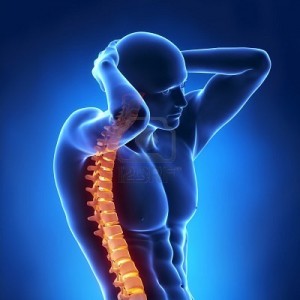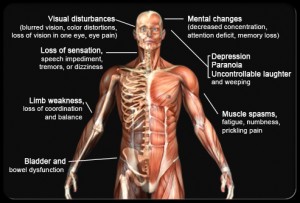All About MS
YOUR POINT BY POINT GUIDE TO UNDERSTANDING ALL ABOUT MS
If you or a loved one has recently been diagnosed with MS, this page serves as basic information to help you understand all about MS, with an emphasis on symptoms. Since the symptoms of Multiple Sclerosis are not always obvious to others, and can be extremely frustrating to explain, you should also send your family members and friends to this page, so they too can learn all about MS, and what you are experiencing.
ALL ABOUT MS POINT #1 – What Is Multiple Sclerosis?
MS or Multiple Sclerosis is a disease that affects the brain and spinal cord, resulting in loss of vision, balance,  muscle control, and even sensation (such as numbness, tingling, or heaviness feeling in limbs). With MS, the immune system actually damages the nerves of the brain and spinal cord.
muscle control, and even sensation (such as numbness, tingling, or heaviness feeling in limbs). With MS, the immune system actually damages the nerves of the brain and spinal cord.
MS gets its name from the buildup of scar tissue (sclerosis) in the brain and/or spinal cord. The scar tissue or plaques form (in an MRI of the brain these plaques look similar to cavities you can see in a dental x-ray) when the protective and insulating myelin covering the nerves is destroyed, this is a process called demyelization. Without the myelin, electrical signals transmitted throughout the brain and spinal cord are disrupted or halted. The brain then becomes unable to send and to receive messages. It is this breakdown of communication that causes the symptoms. Because of this communication breakdown the body literally attacks itself.
MS is two to three times as common in females as in males and its occurrence is unusual before adolescence. A person has an increased risk of developing the disease from the teen years to age 50, with the risk gradually declining thereafter.
According to the National Multiple Sclerosis Society, the condition affects approximately 400,000 Americans and is, with the exception of trauma, the most frequent cause of neurological disability beginning in early to middle adulthood.
Multiple sclerosis is not considered a fatal or contagious disease.
ALL ABOUT MS POINT #2 – What Causes Multiple Sclerosis?
Doctors still don’t understand what causes multiple sclerosis, but there are interesting data that suggest that genetics, a person’s environment, and possibly even a virus may play a role.
Researchers believe that MS may be inherited (passed on from parents to children). First, second and third degree relatives of people with MS are at increased risk of developing the disease. Siblings of an affected person have a 2%-5% risk of developing MS.
Some scientists believe that MS develops because a person is born with a genetic predisposition to react negatively to some environmental agent, which, upon exposure, triggers an autoimmune response.
Some research has suggested that many viruses such as measles, herpes, and the flu may be associated with MS.
ALL ABOUT MS POINT #3 – What Are the Symptoms of Multiple Sclerosis?
 The onset of multiple sclerosis may be dramatic or so mild that a person doesn’t even notice any symptoms. Symptoms of multiple sclerosis vary from person to person and can change over time.
The onset of multiple sclerosis may be dramatic or so mild that a person doesn’t even notice any symptoms. Symptoms of multiple sclerosis vary from person to person and can change over time.
The most common early symptoms include:
- Muscle weakness in one or more limbs (I had this)
- Numbness and Tingling in one or more limbs (I had this)
- Loss of balance (I had this)
- Blurred or double vision (I had this – optic neuritis)
- Eye pain (I had this)
- Slurred speech
- Chronic Fatigue (I had this many months before I was diagnosed)
- Lack of Coordination (I had this)
As the disease progresses, symptoms may include:
- Fatigue. This is a characteristic and VERY common symptom of MS. It may consist of increased muscle weakness, mental fatigue, sleepiness, or drowsiness. Physical exhaustion is not related to the amount of work performed; and many patients with MS complain of extreme fatigue even after a good night’s sleep.
- Dizziness. Many people with MS complain of feeling “off balance” or lightheaded. Occasionally they may experience vertigo – the feeling that they or their surroundings are spinning.
- Heat sensitivity. Heat sensitivity (worsening of symptoms when exposed to heat, like a hot shower, hot tub, or even in some cases high levels of humidity.) occurs in most people with MS.
- Difficulty walking. Gait disturbances are amongst the most common symptoms of MS, due to muscle weakness and/or spasticity, but having balance problems or numbness in your feet can also make walking difficult.
- Vision problems. Vision problems are relatively common in people with MS. In fact, one vision problem, optic neuritis, occurs in 55% of people with the condition. This can result in blurring or graying of vision or blindness in one eye. (This is actually how I came about being diagnosed with MS – I did not need new glasses as my parents thought back then, it was optic neuritis in my left eye)
- Brain Fog. Problems with thinking occur in about half of people with MS. For most, this means slowed thinking, decreased concentration, or decreased memory. Approximately 10% of people with the disease have severe impairment that significantly impairs their ability to carry out tasks of daily living. (This is a real symptom of MS and you’re not just being slow or lazy – some people around you may think you are faking or crazy, but it’s just brain fog and you can have good days and bad days)
- Spasticity. Muscle spasms are a common and often debilitating symptom of MS.
- Abnormal sensations. Many people with MS experience abnormal sensations such as “pins and needles,” numbness, itching, burning, stabbing, or tearing pains. Fortunately, most of these symptoms are not life-threatening or debilitating.
- Speech and swallowing problems. People with MS often have swallowing difficulties and in some cases, they are associated with speech problems as well.
- Tremors. Fairly common in people with MS, tremors can be debilitating and difficult to treat.
ALL ABOUT MS POINT #4 – The Four Courses of MS
• Relapsing-Remitting MS
People with this type of MS experience clearly defined attacks of worsening neurologic function. These attacks—which are called relapses, flare-ups, or exacerbations —are followed by partial or complete recovery periods (remissions), during which no disease progression occurs. Approximately 85% of people are initially diagnosed with relapsing-remitting MS.
• Primary-Progressive MS
This disease course is characterized by slowly worsening neurologic function from the beginning—with no distinct relapses or remissions. The rate of progression may vary over time, with occasional plateaus and temporary minor improvements. Approximately 10% of people are diagnosed with primary-progressive MS.
• Secondary-Progressive MS
Following an initial period of relapsing-remitting MS, many people develop a secondary-progressive disease course in which the disease worsens more steadily, with or without occasional flare-ups, minor recoveries (remissions), or plateaus. Before the disease-modifying medications became available, approximately 50% of people with relapsing-remitting MS developed this form of the disease within 10 years. Long-term data are not yet available to determine if treatment significantly delays this transition.
• Progressive-Relapsing MS
In this relatively rare course of MS (5%), people experience steadily worsening disease from the beginning, but with clear attacks of worsening neurologic function along the way. They may or may not experience some recovery following these relapses, but the disease continues to progress without remissions.
ALL ABOUT MS POINT #5 – Your mind, and the condition of it is your most powerful weapon against this disease.
Please understand that this information is not intended to scare you, but rather provide you with accurate information. Just because a symptom is listed as common, does not mean you will automatically experience it. Understanding all about MS is simply about you becoming as knowledgeable as you possibly can. What and how you think is essential to how you live with MS…it is the difference between living or surviving. I encourage you to spend time learning all about MS and the Mind.
Kellie Alderton


Thank you for sharing some information. I’ve not purchased your book yet. I see there is a paperback edition. Do you think there will ever be a Kindle edition? My symptoms were manageable for the past couple years. My diagnosis came January 2018. This year my symptoms feel worse, like lose of balance and often fatigue. Thanks again for reaching out to help.
Yolande Persico